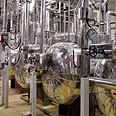
IAEA says Russian scientist may have aided Iranian nuclear program
UN nuclear watchdog launches probe into possible involvement of Russian scientists in Tehran's nuclear enrichment program. IAEA says still trying to authenticate report, as Iran claims data fabricated. Man believed to be acting independently
International nuclear inspectors have begun investigating whether a Russian scientist helped Iran conduct complex experiments on how to detonate a nuclear weapon, according to European and American officials.
As part of the investigation, inspectors at the International Atomic Energy Agency (IAEA) are seeking information from the scientist, who they believe acted on his own as an adviser on experiments described in a lengthy document obtained by the agency, the officials said.
The officials, who spoke on the condition of anonymity, said that the document appeared authentic, without explaining why, but they made it clear that they did not think the scientist was working on behalf of the Russian government.
Still, it is the first time that the nuclear agency has suggested that Iran may have received help from a foreign weapons scientist in developing nuclear arms.
'Evident piling up'
The American and European officials said the new document, written in Farsi, was part of an accumulation of evidence that Iran had worked toward developing a nuclear weapon, despite Tehran's claims that its atomic work over the past two decades has been aimed solely at producing electrical power.
According to Friday reports in several leading newspapers, a closed-door briefing held in February at the agency's Vienna headquarters, had the IAEA's chief nuclear inspector, Olli Heinonen, present diplomats from dozens of countries with newly declassified evidence, documents, sketches and even a video that he said raised questions about whether Iran had tried to design a weapon.
Among the data presented by Heinonen, were indications that the Iranians had worked on exploding detonators that are critical for the firing of most nuclear weapons.
The Iranian envoy at the briefing called the charges "groundless" and protested that the tests were for conventional arms, to which Heinonen reportedly replied that the experiments were "not consistent with any application other than the development of a nuclear weapon."
He called the shape and timing involved in the firing systems and detonators "key components of nuclear weapons."
Heinonen did acknowledge that the agency "did not have sufficient information at this stage to conclude whether the allegations are groundless or the data fabricated."
'Documents fabricated'
Iranian officials have said repeatedly that the documents the agency is using in its investigation of Iran's past nuclear activities are fabrications or forgeries, and that any experiments were not related to nuclear weapons.
Iran has said the same about the new evidence, although the IAEA has not shown the full document to government officials in Tehran. Instead, Iran has been given only five pages of excerpts that have been translated from Farsi into English.
The Western officials said that the conditions under which the inspectors obtained the document prohibited them from revealing it in full to the Iranians, out of fear that doing so could expose the source of the document.















